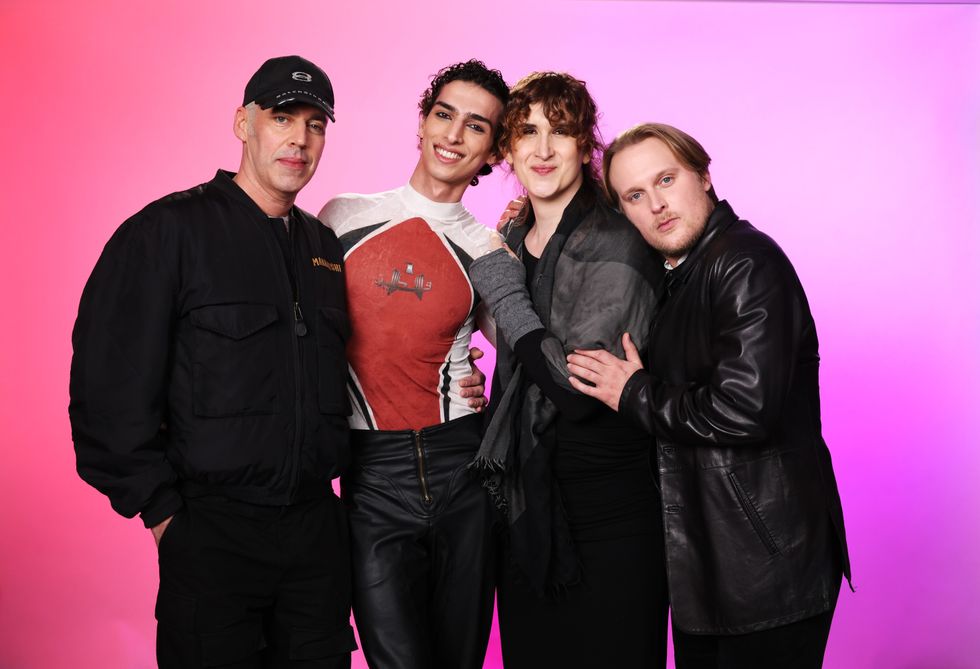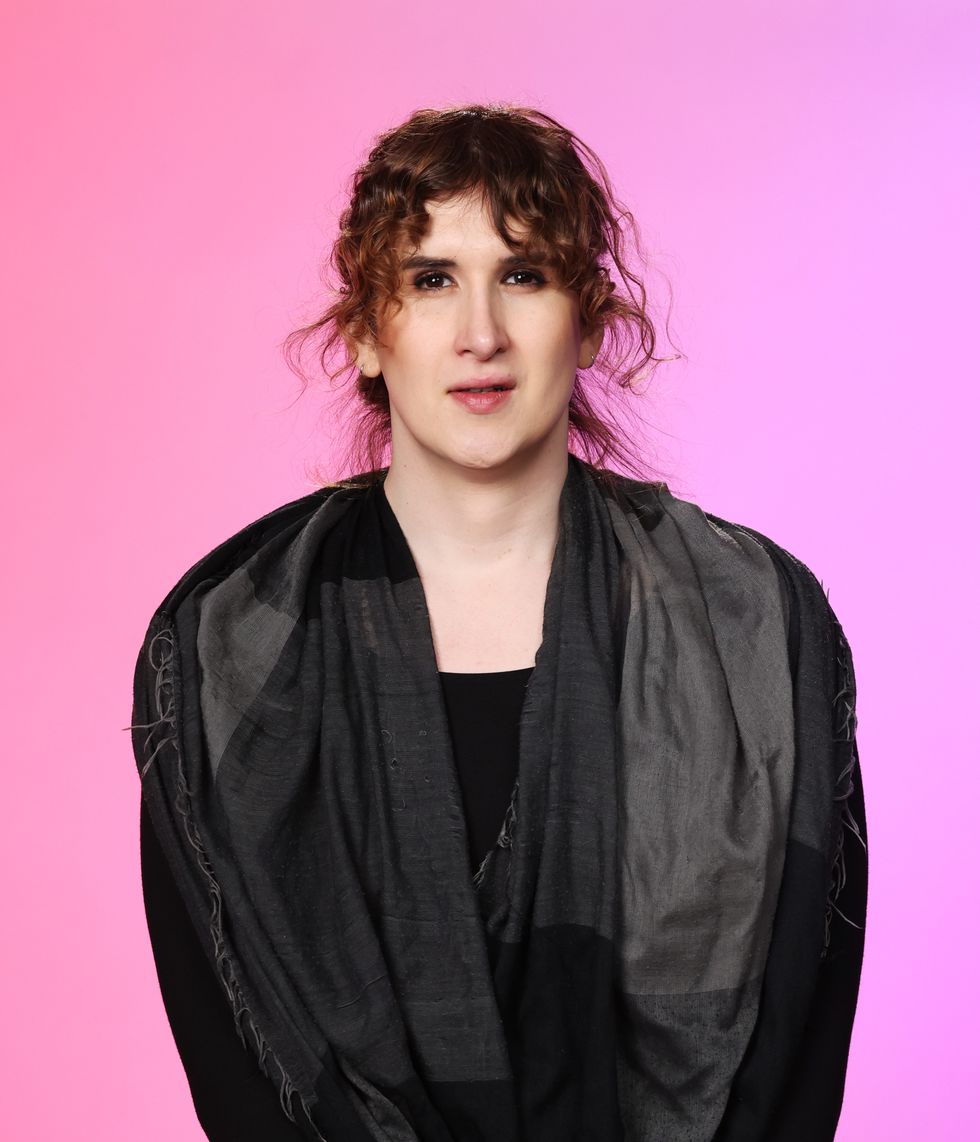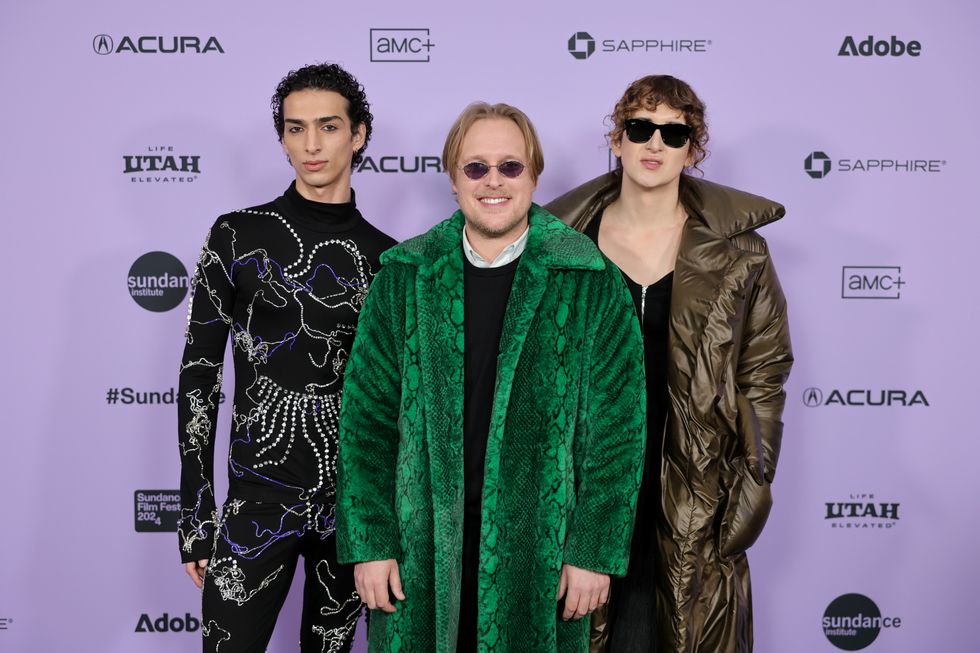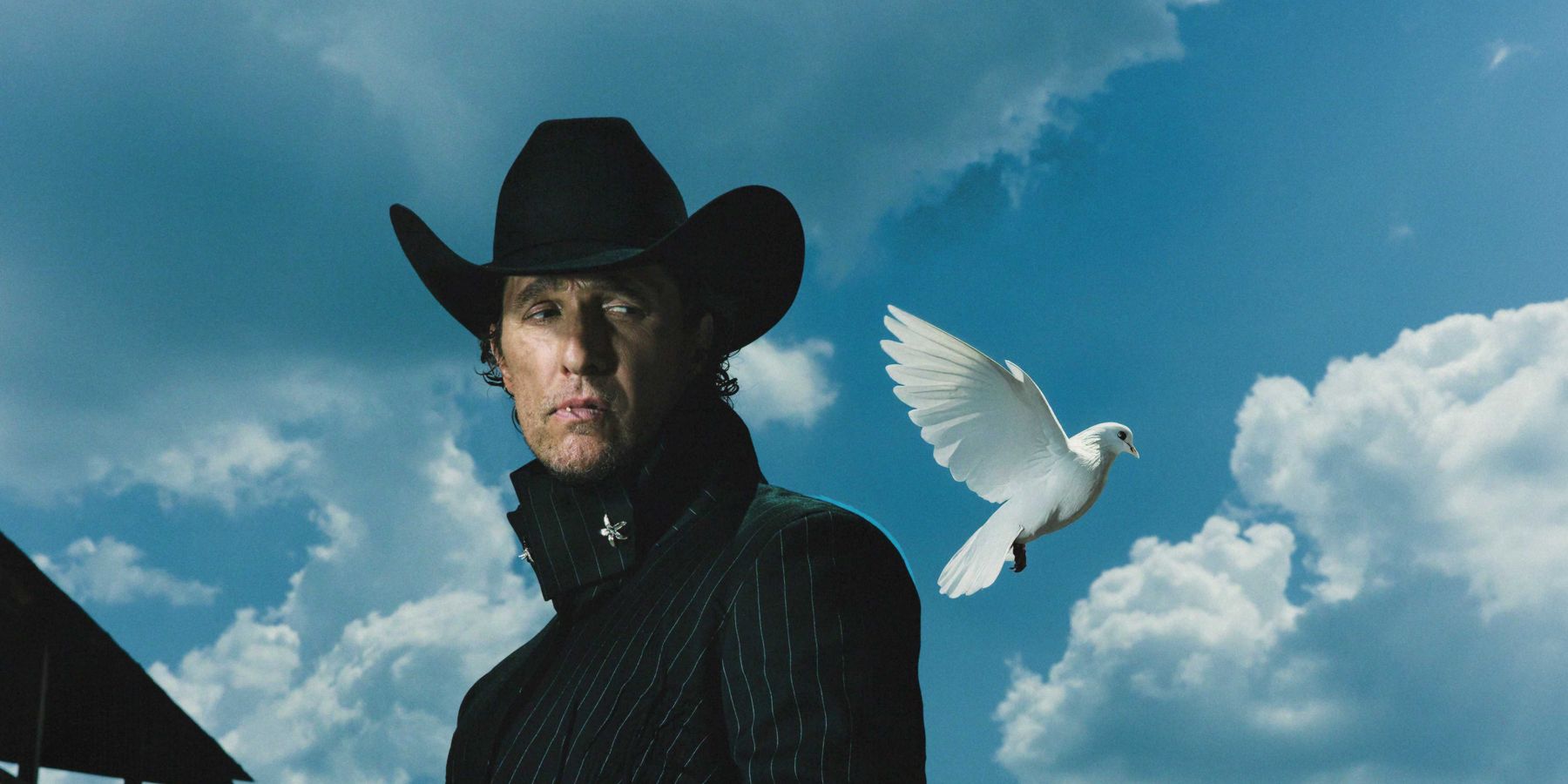
Theda Hammel Is Exploring Beauty and Queer Id
By Kyle Turner
Jan 26, 2024
There are two noises that stick out in the memories of a certain kind of upwardly mobile, progressive, aspiring queer person living in New York from the summer of 2020. One is the tension between the raging sirens from police cars and the uncanny silence in streets that once wore its thrumming soundtrack of chaotic life like a badge of honor. The other is the sound of white people doing the most incredible intellectual gymnastics to assert their goodness, their upstanding social and political values. From Black Lives Matters to COVID masking, any insinuation that could be made from the smallest social gesture was, for many, suddenly magnified, with fascinating consequences, good and bad.
Naturally, it would take a sound engineer and musician to be able to cut through the noise of chatter, posts and threads about queer politics. Theda Hammel, the whip-smart co-host and producer of podcast NYMPHOWARS, brings her brilliance to Park City this Sundance Film Festival with her feature directorial debut Stress Positions, starring John Early as Terry Goon, a broke do-gooder housing his hot Moroccan model nephew Bahlul (Qaher Harhash) as he recovers from a broken leg, and Hammel as his acid-tongued best friend Carla, determined to figure out why Terry would keep this beauty a secret, all in the midst of the COVID lockdown of summer 2020 in Brooklyn.
Hammel, with her ear for conversation and the rhythms of language and another Early short called “My Trip to Spain” that premiered at Sundance last year under her belt, has crafted a scaldingly funny and trenchant satire of modern queer urban life and the knottiness of beauty, change and politics. Whipping between farce, slapstick and popper-induced melodrama, Hammel sets her delectable fangs into the social milieu’s gap between who they are and who they think they are.
Hammel spoke to PAPER over Zoom, sporting slate gray fingerless gloves and bouncing, tied-up wavy hair, and dove into a wide-ranging conversation covering her career with music and sound design, the notion of freedom and why we’re all kind of annoying the first time we go to Fire Island.
Can you tell me about how Stress Positions began and your collaboration with Faheem Ali?
We share story credit, he's in the movie, he plays Ronald, and we also live together. The story is very much shaped by our conversations about this character about the Bahlul character. And the idea itself is something that comes from nowhere. The idea was, Okay, this kid with a broken leg. He's a model, he has this ethnicized identity, and then you have John panicking and trying to cook for him. That was basically the whole idea was John trying to cook for this character, then you go, okay. I've put a character on paper. He's different than I am. What he is even like came about through extensive conversations between Faheem and I.. But the process went right up until the very end, because there was a huge written component that was always fungible at any given moment, which is the voiceover.
What is your favorite sound? And what's your favorite sound to use as raw material to turn into something else?
In the context of [NYMPHOWARS], it's very nice to be able to hit an explosion sound effect, to punctuate a punch line. In the course of finishing this movie, I had a strong realization about the virtues of a much more abstracted and focused sound design. You can never have confidence that you're gonna have a perfect surround sound playback.. Being a lot more blunt and precise about what exactly needs to be heard is a better tool. I always thought that my wish would be to have a full Atmos sound design or a million layers of crickets and wind and you could hear the cars moving outside, and there were so many moments where I actually ended up abandoning all of that.
Did you feel it was a different experience creating the soundscape for Brooklyn as opposed to Silver Lake, which you did for “My Trip to Spain”?
This movie is so jammed with stuff, the people never stop talking. I feel the rhythm is a lot more propulsive. And all this off-screen sound that I really wanted I felt was clogging up the works. [But] there is some off-screen storytelling. There's a lot of sirens and the occasional helicopter. There are these sounds that are actually more distant than I remember them being that summer in New York [in 2020]. I remember that there was a very pronounced feeling of something weird. In the sound world of New York, it got really quiet, you could always hear a siren. And then closer to the middle of the summer during the protests, there was a lot of police presence. There were helicopters at night, there were different kinds of sirens, there was a different kind of sound. I worked with a wonderful sound designer Ryan Vilia.
You studied music and sound engineering, right?
Yeah, that was the degree that I got to stay busy during my mid-20s. The thing that happened was, I got the degree. And the first thing I did with it was sound design for a play that I was in. So that led to a few other things where I sound designed and acted in performances, and then those performances took over. And so I've never properly worked as a sound engineer. But I think without it, I wouldn't have gotten to do any of the performances.
Can you imagine your career with sound or with art going differently than it has when you were starting out studying this?
Well, I wanted to make music. I wanted to be a musician. I'm a little bit sad that I haven't made more music than I did. Nothing ever led to a high-stakes deadline. So I was not accountable to anybody. Because music is something that I could make in my own room. And if you had a gig coming up, you'd be accountable to maybe write or prepare something. So the way I ended up in making a movie in the first place was that I thought, well, to hell with this, I'll write a musical. I hadn't ever written a play or a musical or anything like that. That's what I was doing when the idea came to me to deviate slightly, and write a little short thing for John, which is what branched off and became this movie. But it broke off from a thing that was basically a musical project for stage that shares a lot of the same themes, as this was about impossibility of travel and resentment among friends and the problems of exotification.

Photo by Monica Schipper/Getty Images for IMDb
And the failure of queer politics in its ability to make material change.
Yes, I think it’s about that, too. It's a general lassitude and inability to really make contact or to make change or to change oneself. So that might be a theme that I am drawn to. I hope I don't have to jettison that whole musical because it overlaps too much with this movie. I'm sure I'll find a way to do it. Because now I have to think of what else to do.
I certainly hope so. I mean, we were acquainted on the internet for a while but I really found your music via your EP SondHamm. Your work, which includes a couple of EPs, a short film, and now your feature — they're all to a degree interrogating these ideas of queer intimacies and vulnerabilities, and the things that function as obstacles to those things like intimacy.
There's no shortage of examples of people in our current day trying to do good and achieving the opposite. Something about our relationship to goodness has become very, very confused. And I think it has to do with all of the competing voices in our heads at all times telling us what goodness means or what it entails. And speaking with a total, angry confidence about what it actually means to be good. And I think that if you are a gullible person, and if you're very plugged in — and I think I am a variable gullible person, I think that Terry Goon is also a very gullible person — too many contradictory messages get in there, the result is a form of paralysis where you want very desperately, maybe not even to do good but just to not be seen doing bad, to not be fault worthy in the eyes of this super ego, and as a result, you end up basically falling on your ass, and he's always falling over. I do think that their plight is a little bit pitiable, because of the blasted social environment that everyone has inherited.
Do you feel the quantification of goodness has changed? Do you feel it changed between “My Trip to Spain” and Stress Positions?
Yes, I think that basically, in both cases, it's a study of ambivalence. In the case of “Spain,” it’s like, I'm going to go and send my friend off to her gender-affirming surgery. So say you announced that intention to yourself, but then everything you do is actually a sabotage of your friend. And everything you do is an attempt to actually put doubt into her head. I feel this is consistent with how I see people behaving all the time.
The roles are reversed in this movie, because the ideas came about around the same time. The roles are swapped. I play more of the character that John plays in “Spain”, where the Karla character says, I just want to meet the model. I just want to help. But what she really wants to do is actually get in there and mess things up. And I think that there is something analogous, this might be an overreach, to some foreign policy language — like going out of the goodness of your heart to spread freedom. And then they’re really there to fuck it up.
Not only because of the way that the characters confuse North Africa and the Middle East, and it's very funny, and resonant in this time. I definitely was getting a vibe of the US War on Terror, the way of promoting liberal democracy in foreign places.
This was the big thing going on in the zeitgeist during my developmental period, or during the millennial developmental period. And so I feel it does make sense for me, trying to get at the heart of what my generation is actually like; to go back to the language and to the images of that time, and to some of the rhetoric in the propaganda of that moment, which had a lot to do with questions of freedom, what freedom means and how good it was compared to its alternatives. That we should spread this essential, excellent substance called freedom everywhere in the world. It's very clear that that was deceiving. The language was deceptive.
There are a lot of mental gestures from that time that have trickled down and have made their way into the small-scale social scenario that's in this movie. For example, all of this confusion about where anything is and who's who. So the way I see it, we wouldn't have been able to have a President who would have been able to talk the country into going to war, for example, in Iraq, if it hadn't been for a general predisposition to not really know where anything is.
So much of the US’ belief about itself is that its political paradigm is better than theirs because they're “savages”.
This logic is at work in acts of war and chauvinism. This is maybe a more inflammatory point, but I feel somehow we haven't quite escaped that logic in our politics of sympathy.
When you have a group that you can mobilize resentment toward on the basis of these very chauvinistic generalizations, that same logic suddenly is reversed, but maintained when everybody decides, No, we need to do better, we need to be better people. And so then we have these general ideas about where our pity should be directed. But these are not more specific, these have become more refined forms of human goodness, this is the same logic with the valence flips.
I don't think goodness is necessarily a staple position either, and it's also highly dependent on cultural context. There is a line in the movie, I think that Terry says, making this assumption about the model (who is from Morocco) that is like, “They must throw gay people off of rooftops.” Which is a talking point that is currently being resurrected by those with Zionist beliefs.
Well, the thing that you are always faced with, with the question of gay rights is, is this the most paradigmatically important value in the entire world? And if that's the case, if that is your belief system, are you just ipso facto against anyone that doesn't think that gay rights is their highest priority? Right? If gay rights are being leveraged in that way? Then we should attend more to the logic behind that, which is instrumentalized.
You can find any number of people in the world for whom gay rights are not their utmost priority. But what you have there is that you have a standard of goodness, a metric of goodness, it's a binary metric of goodness, thumbs up gay rights, thumbs down not gay rights. But following that logic through can lead to some very bizarre and barbaric conclusions.
To add to it, trans rights. These are both important issues. These are both important political projects. But they're not substitutes for I don't know, for genuine, social security.

Photo by Monica Schipper/Getty Images for IMDb
What I think is especially interesting is that you connect these talking points and this rhetoric that a certain kind of millennial queer person is tapped into, but not necessarily substantively with:realities of the acts of the “modern” or “developed” gay and queer cultures that are still predicated on a kind of exclusion, that is also measured in a certain level of desirability.
I do feel like the big disappointment in finding your place in the LGBT world or the gay world is how the extent to which your liberation in that space is dependent on your beauty or your personal attractiveness. And that this will never be totally evened out. And part of the way this movie is working is that all of these people are so excited and panicked by the beauty of this young person who is different from them by being younger, by being of a different ethnic background, but also by being extraordinarily more beautiful than they are. And so they're kind of falling apart in face of this beauty.In the case of Terry, this is his nephew. Terry in his attempt to be good is doing everything he can to just not think about this fact. Trying to do everything he can to not have an unwanted thought and to treat this very beautiful model in his house, as he would any person out of the pure goodness of his heart. Meanwhile, everyone around him who are these id figures are all clamoring to lay eyes on him. So in fending them off, he's fending off this suppressed id.
Speaking of beauty, did this film change the way that you want to engage with beauty as an aesthetic subject matter?
It's consistent with how I've wanted to treat it for everything that I've ever done. I think the big thing is that in transitioning, I suddenly gained access to a surplus of beauty that I hadn't had available before, which is different than saying, now I'm so beautiful. I'm the most wonderful, most splendid looking woman ever to live. It was that there's a pretty big difference between going through life as a man and going through life as some variety of woman. And part of that difference is just that women are beauty.
And so you are suddenly beautiful in a new way. It's spoken of in the movie. I do think that beauty is a very important thing to try and look at. You don't always have to look at it in this lusting way. I don't necessarily see the beautiful young male operating in this movie in the same way that he would in a Dennis Cooper book. Rather than driving people to their darkest, bleakest impulses, or like Death in Venice even having them fall apart and die. Here, it turns them all into fools, it's played as a slapstick thing.
There’s a sequence in the film that takes place on Fire Island. Have you gone before?
Oh yeah, and I love it. Right now, I feel like I can go to Fire Island as a trans woman with gay podcasts and I can enjoy myself and relax because it's not imperative on me to really blend in or to have the maximum gay sexual experience that can be a component of any visit to that island. But there have been times of my life earlier on when my assimilation to the gay world was not so smooth, where you do go there and you want to start denouncing it in an almost religious way. I want to say, “Look at all of you you're all gonna burn in hell, you fucking like this, it is disgusting and despicable!” It's motivated by this feeling of like, why can't I do this? Why can't I live like these people? Why is nobody paying any attention to me? But I do feel like that but some part of that trickles over into this character who does go to Fire Island and denounces the whole place with a few curse words.
On all of our first experiences on Fire Island we turn into Larry Kramer writing Faggots when we step off the ferry.
Exactly. What a good that's so much better but exactly like that. It's a Larry Kramer impulse that I have here being ventriloquised in a slightly more religious register.
I was the exact same way. And then I had my first Fire Island trip the year before last year, and it's like, oh, this is quite nice.
It's actually heaven. The two days I went,one day to scout and one day to shoot with the little camcorder by myself, no crew, and it was the best day of the entire shoot, the most free, the most wonderful. The best footage, I think all came from that.

Photo via Getty/ Neilson Barnard
We must talk about your collaboration with John Early, whom you met at Atlantic Theater Action Program. Do you remember the moment when you were like “we have to work together”?
I was the assistant director on a production of The Caucasian Chalk Circle Play by Bertolt Brecht. John and I were very young, we just graduated college. John went to Atlantic. I couldn't get into Atlantic, so I did a summer program and then ended up collaborating with one of my teachers there as her assistant director. And so the first time I ever saw John act, I was totally staggered. It was not a comic performance. It was before John was really accessing his full comic inclinations, he was auditioning for the romantic lead in The Caucasian Chalk Circle, Simon Shashava. And he gave the most brilliant audition I've ever seen but didn't end up playing that part.
Ever since then, I've been in total awe of him. It was quite a few years into our friendship before we actually started working together, hosting these little variety shows. I think it's when we did Marie and Bruce, which John produced. I've said this a lot about John, but you're not actually friends with a person's talent, right? So it can completely surprise you. Like, when I'm working with John on set, I feel like we're speaking as friends and we're trying to solve problems together. And then when I get into the edit, I'm always so surprised at the density of characterization that he's able to do, his sheer physical skill, like the twitches of his face and his gestures, his rapport with the camera. It's like, oh, this is a different person than the one I'm friends with. This is a totally amazing surprise.
You once said in an interview that you are, quote, a “post-tipping point bourgeois transsexual woman.” Or, as some might say in internet parlance, mother. What do you think is the future for post-tipping point bourgeois transsexual women in cinema?
I know that what it means for me is that I'm not really compelled to view my transness as being that extraordinary or worthy of interest. My experience of my own transness is that there's not anything especially noble in it. I'm actualizing along an axis that is pretty well-trodden. It's not quite revolutionary. And it's not so extraordinary. But it can be made interesting, as a starting position. And by analogy through and with other things, I think. And so I think that the analogy will continue to be explored. I don't know if everything has to have a trans person in it, or everything has to speak to some trans theme. But I guess at the heart of it all is this fact of one's ability to change. Transition does work, like you do change. You just don't change maybe to the extent that you hoped. And you still retain so much that you maybe wish weren’t there in your sense of yourself. You're always in tension between what you aspire to be, what you used to be, and how much you've changed.
Photo via Getty/ Neilson Barnard
From Your Site Articles
Related Articles Around the Web
MORE ON PAPER
ICONOS: Pepe Aguilar, El Oficio del Tiempo, la Voz del Silencio y el Peso del Legado
Español
Jan 19, 2026
Entertainment
Cynthia Erivo in Full Bloom
Photography by David LaChapelle / Story by Joan Summers / Styling by Jason Bolden / Makeup by Joanna Simkim / Nails by Shea Osei
Photography by David LaChapelle / Story by Joan Summers / Styling by Jason Bolden / Makeup by Joanna Simkim / Nails by Shea Osei
01 December
Entertainment
Rami Malek Is Certifiably Unserious
Story by Joan Summers / Photography by Adam Powell
Story by Joan Summers / Photography by Adam Powell
14 November
Music
Janelle Monáe, HalloQueen
Story by Ivan Guzman / Photography by Pol Kurucz/ Styling by Alexandra Mandelkorn/ Hair by Nikki Nelms/ Makeup by Sasha Glasser/ Nails by Juan Alvear/ Set design by Krystall Schott
Story by Ivan Guzman / Photography by Pol Kurucz/ Styling by Alexandra Mandelkorn/ Hair by Nikki Nelms/ Makeup by Sasha Glasser/ Nails by Juan Alvear/ Set design by Krystall Schott
27 October
Music
You Don’t Move Cardi B
Story by Erica Campbell / Photography by Jora Frantzis / Styling by Kollin Carter/ Hair by Tokyo Stylez/ Makeup by Erika LaPearl/ Nails by Coca Nguyen/ Set design by Allegra Peyton
Story by Erica Campbell / Photography by Jora Frantzis / Styling by Kollin Carter/ Hair by Tokyo Stylez/ Makeup by Erika LaPearl/ Nails by Coca Nguyen/ Set design by Allegra Peyton
14 October
Entertainment
Matthew McConaughey Found His Rhythm
Story by Joan Summers / Photography by Greg Swales / Styling by Angelina Cantu / Grooming by Kara Yoshimoto Bua
Story by Joan Summers / Photography by Greg Swales / Styling by Angelina Cantu / Grooming by Kara Yoshimoto Bua
30 September




